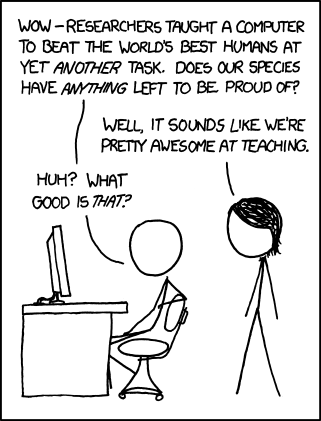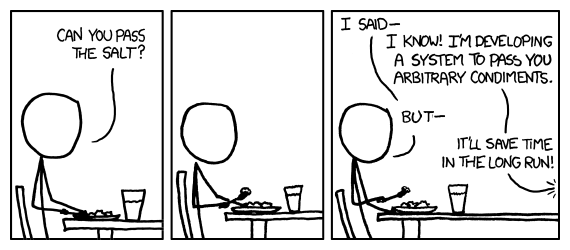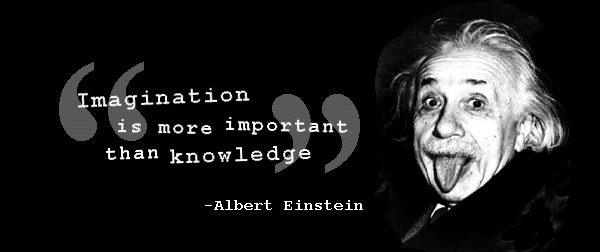Are there things you can’t teach?
 I like to think of myself as an educator. I’ve done a fair bit of teaching, and I develop educational software. I like education for a lot of reasons, but first and foremost because of the old proverb, “if you give a man a fish you feed him for a day, but if you teach a man to fish you feed him for a lifetime.” Education can give a person the power to provide for themselves and others. Both the person that learns how to fish and the society in which they live are better off that way.
I like to think of myself as an educator. I’ve done a fair bit of teaching, and I develop educational software. I like education for a lot of reasons, but first and foremost because of the old proverb, “if you give a man a fish you feed him for a day, but if you teach a man to fish you feed him for a lifetime.” Education can give a person the power to provide for themselves and others. Both the person that learns how to fish and the society in which they live are better off that way.
Something I hear from time to time is that “you just can’t teach X”. Another more tautological version that I hear is, “you just can’t teach X, and you can only know that you can’t teach X until you have done X”. It’s one of those circular arguments you can’t refute that makes my brain explode. But it’s also very troubling. If you can’t teach X, and X is necessary to “fish”, does the man have to rely on others to fish? Or starve? Oy…
That said, every time I’ve been told the tautological version about some X and then went out and done X myself I’ve always been able to teach it to others somehow, and it’s always turned out that I had already been taught X by others before doing X myself. I feel like I’ve done a lot of different things over the years too, so the fact that it has never held up has always made me wonder. After hearing this argument enough times I thought about it. What are the things, if any, that we can’t teach somebody else? I suspect there is more, but these are the candidates I came up with so far:
Unknowns
We can’t teach the things we don’t know ourselves. This can be things like unsolved problems or (currently) unknowable problems like what the weather will be like 5 years from now or what the stock market will close at tomorrow. We can make unsubstantiated claims, we can have faith in things, and we can make predictions. But because we don’t strictly know these things I wouldn’t classify transferring those beliefs about unknowns to others as teaching so much as propagating a viewpoint.
Raw natural talent
Some people are just naturally gifted at different skills and subjects. Having a strong passion for something can very often help you develop a skill, but sometimes passion and work isn’t enough. I realized pretty early in life that despite my best efforts I would never play quarterback for the Tiger-Cats. 😉
Experience
Educators can teach general terms and abstract principles. But a lot of careers involve having to know a very large number of very esoteric pieces of information that can’t be abstracted into more general terms or principles. A football coach that has seen every permutation of the game over 30 years can’t just transfer this knowledge instantly to another person. Each individual piece of information can be taught, but the sum total cannot, at least not in a reasonable amount of time. In situations like these, we find experienced mentors that have “seen it all before” playing an educator role instead of more traditional teachers.
Mindsets
Mindsets are a habitual attitude and way of thinking. Books have been written on just how important mindset can be to success. There is much interest and research into the “entrepreneurial mindset”. Mindsets can be analyzed and described, but “teaching” anybody a mindset is pretty difficult and arguably impossible. There’s not much to teach anyways, a “teacher” can really only make a person aware of possible mindsets. Their mindset is something people have to choose for themselves. Thankfully research shows that mindsets, and entrepreneurial mindsets in particular, are indeed choices and not fixed. Mindsets can’t be taught, but they can be influenced by external factors, coached, and inspired by our peers.
Vision
Vision is the mental image of what the future will or could be like. I think everyone has vision, but accurate vision? It requires the right mindset to even bother trying, the experience to have a chance at being accurate, and some degree of luck to actually be accurate.
Problem discovery
How do you discover problems that there is some value in solving? If something is unknown, and for whatever reason enough people want to know what is unknown, that can be considered a problem worth solving. If somebody needs something, creating something that fills that need can be considered a problem worth solving. There are other examples of problems worth solving. But how do we discover things like what is unknown or what people need? We can explore subject matter until we reach unknown problems. We can ask people. We can keep our ears open. We can observe people.
My grade 6 teacher told me a story about Sylvan Goldman, the man that invented the shopping cart. I never knew if it was true or not, but he claimed that Sylvan was just sitting outside his grocery store in the parking lot watching a woman try to carry her groceries to her car. She was struggling to carry it all and as she went to put it into the car her grocery bags broke and made a mess. It was right then that Sylvan had his eureka moment.
We can teach people principles about how to discover problems that there is some value in solving, but they have to do it. That’s where the right mindset can be important. And maybe getting a little lucky too. What if those bags never broke?
Opportunity recognition
Opportunity recognition is related to, but not identical to problem recognition. Once we have identified an unknown or a need, the process of solving that unknown or fulfilling that need is something else entirely. Sometimes solving a problem involves existing solutions used in a new way, and sometimes they require a new solution (most often made up of some new combination of things that already exist). The former requires enough experience to identify the solution required, the latter may require some imagination (see below). Some awareness of economics can be a big help here too – given the resources at ones disposal or that could come under ones disposal to solve the problem, is the problem worth solving for that cost? The more imagination the solution requires, the more unknown the economic cost of providing a solution becomes.
Sometimes opportunity recognition involves no problem discovery at all. Sometimes opportunity recognition involves making an improvement to something that already works just fine.
Like problem discovery we can’t strictly teach opportunity recognition so much as general principles. But we know that experience, mindset, and imagination are key.
Imagination
Let’s say we have a problem identified, the experience required to solve it, and the mindset to seek out both. Is that enough? What if Sylvan just never thought to put wheels on a cart? A painter or a musician can be extremely technically skilled and experienced, but how do they come up with the next great work of art?
We can’t strictly “teach” imagination but we can foster, nurture and exercise imagination through both unstructured experiences and by structuring learning opportunities. We can do things without a need to define right, wrong, or a particular value that is being sought out. In other words, play time. 🙂 Instead of giving somebody the solution to a problem, we can take a problem-based learning approach and give them only what they need to know to derive a solution to a problem and provide guidance when it is sought out. Alternatively, we can present a problem and then keep asking the right questions until the learner is able to solve it.
Overall aside from raw natural talent I don’t think there is much that can truly be described as “unteachable”. Experience can be accelerated with mentorship, mindsets and imagination can be fostered and nurtured, etc. It might not be traditional teaching in a classroom, but in all cases a person can somehow be instructed.
But what do you think? Are there things we can’t teach? What are they? And can you describe why we can’t teach them?


